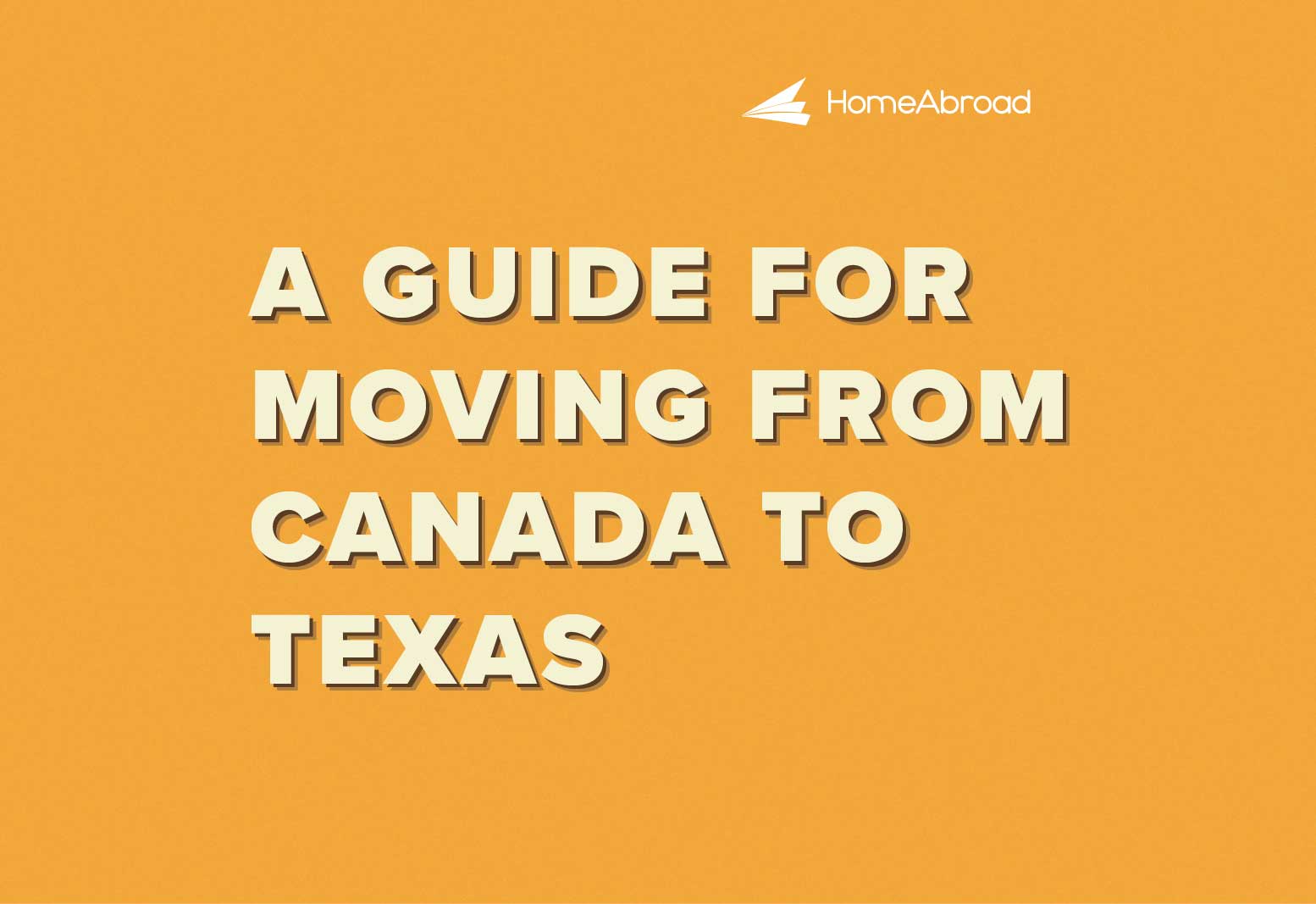Editorial Integrity
Moving to the US can feel overwhelming, filled with unknowns and uncertainties. HomeAbroad editorial team includes certified immigration experts/USCIS nerds who translate complex legalese into clear, actionable moving and visa guides. Rest assured, every article undergoes a reader-centric editorial process to ensure accuracy and reflect current regulations.
Are you a Canadian considering a move to California? With its beautiful weather, bustling cities, and wide array of job opportunities, it’s no wonder many immigrants choose to call California home.
But before you pack up your life for the Golden State, there are some essential things to consider. Before you move, there’s a lot to learn, from visa requirements to housing options and cultural differences.
This comprehensive guide offers you everything you need to know before relocating to California. We’ll cover the visa and immigration process, employment opportunities, cost of living considerations, financial planning tips, tax implications, and more.
Table of Contents
Overview of California
California is a populous state in the USA, with an estimated population of nearly 39 million. So, with its booming economy and eclectic culture, it’s not a surprise that it has become a popular destination for immigrant workers worldwide, including Canada.
The state offers a unique mix of urban and rural living, with bustling cities like Los Angeles and San Francisco and peaceful rural areas. California also boasts a rich cultural heritage, from its art scene to world-renowned restaurants.
California’s diverse population makes it an attractive place for immigrant workers. According to the U.S. Census Bureau, 26.5 percent of the state’s population was foreign-born in 2017-2021. In addition, 16 percent of the immigrant population came from Canada.
Benefits of Moving to California for a Canadian citizen
From its gorgeous natural beauty to its bustling cities and warm climate, there are many advantages to living in California. Here are some benefits you can anticipate when moving to the Golden State:
- Employment Opportunities: California is home to some of the most innovative companies in the world, such as Apple, Google, and Amazon. Additionally, according to the Department of numbers, California added 26,800 jobs in November 2022.
- Cost of Living: California’s cost of living is lower than many other U.S. states, making it an affordable place for immigrant workers. California has an average monthly cost of living of $1600.
- Climate: With its mild weather year-round, California is the perfect place to enjoy outdoor activities like hiking or surfing.
- Education: California boasts one of the best education systems in the world, from its prestigious universities to its top-notch primary and secondary schools.
- Culture: California is known for its vibrant and diverse cultural scene, from its world-class restaurants to its iconic music venues and festivals.
- Safety: According to the United Nations Office on Drugs and Crime (UNODC), California has a lower crime rate than other U.S. states, making it a safe space for immigrant workers.
7 Things to Know Before Moving from Canada to California
The state’s attractions are not mentioned here but boast many exciting attractions. Known as the USA’s most famous and internationally renowned country, the state houses the Hollywood sign, the famed Golden Gate Bridge, Yosemite National Park, and Disneyland.
Most cities have their unique history, culture, and identity. It is also the country with the best prominent cultural diversity. Approximately half a million Canadian Americans reside in the U.S. Many pursue California lifestyles.
Before moving to California, it’s essential to know some critical facts about relocating from Canada. Here are nine things you need to consider:
1. Housing Options: Whether you’re looking for an apartment, house, or condo, California offers a variety of housing options to fit your budget and lifestyle. The Bay Area (including San Francisco) is known for its high housing prices, while other cities like Los Angeles and San Diego are more affordable.
2. Employment Opportunities: California is home to many leading tech companies, so if you’re looking for a job in the technology sector, this may be the perfect place for you. In addition, California also has opportunities in industries like healthcare, hospitality, and retail.
3. Credit History: Keeping your credit history in good standing before you move is essential. It can help you secure rental housing, open a bank account, and obtain financing for a car or home.
4. Cultural Differences: Knowing the cultural differences between Canada and California can help you prepare for your relocation. For example, California’s tipping culture differs from Canada, and you should also be aware of the state’s more relaxed attitude toward public drinking.
5. Family Members: If you are relocating with a family member, they may require a visa or green card, depending on their citizenship status. Additionally, keeping track of your family members’ legal statuses is essential to comply with U.S. law.
6. American Retirement Benefits: If you plan to stay long-term, you must be aware of the United States’ retirement benefits and tax laws. Your Canadian pension may not be valid in the U.S., so it’s essential to research how to obtain your retirement benefits in the U.S.
7. Earning More Money: Finally, the cost of living can be higher in California than in Canada, but you may find more opportunities to earn money if you are keen to work hard and invest strategically. With a strong job market and many business opportunities, you can make more money in California than in Canada.
There is no denying that moving from Canada to California can be daunting. Still, with the proper preparation and research, it can also be an exciting opportunity for a new chapter of your life.
Moving to California from Canada Checklist
A checklist made for keeping your needs in mind as an immigrant so your migration process will go by in a breeze.
- Apply for a visa or immigrant status: Depending on your plans, you may need to apply for a tourist visa, permanent resident card, or another immigrant position such as T.N. Status or Green Card.
- Research housing options: You will need to decide between renting or purchasing a home in California and explore various neighborhoods to find the best fit. You can also opt for a real estate agent from HomeAbroad to assist you when it comes to finding a house. They are experts in their fields and possess international expertise to help you on the home-buying journey.
- Find a job: Start researching employment opportunities in California and how to apply for jobs as an immigrant worker.
- Check your credit history: Review your credit history to be prepared when applying for loans or mortgages.
- Research medical insurance: Search for medical insurance options available to immigrant workers, like a public or private health plan.
- Apply for a driver’s license: If you plan to drive in the state, you must apply for a California driver’s license.
- Register for a Social Security Number: If you plan to work in the United States, you must register for a Social Security number.
- Consider tax implications: Familiarize yourself with the income taxes and other taxes immigrant workers must pay in California. You can also learn about taxes in California through his blog.
- Bringing a family member: If you plan on getting a family member, study the visa and immigration requirements for them.
- Register your vehicle: If you plan to bring a car or other motor vehicle to California, you must register it with the state. Then, you should also look up the process of moving your car from Canada.
- Enter the Diversity Visa Lottery: If you are a Canadian immigrant, you may be eligible to enter the U.S. Diversity Visa Lottery and potentially gain permanent residence in California.
By researching and creating a plan before you move, you can ensure your transition goes as smoothly as possible. With these tips, you can make the most of your new life in California.
Good luck on your journey!

Find the best real estate agent with international expertise
Connect with a HomeAbroad real estate agent in your area.
Bring your family to the USA from Canada.
The Family Based Petition is often available to Americans seeking to sponsor their families. The Immigration and Citizenship Act permits immigration from foreigners who reside in the United States. The government aims to ensure all citizens’ health, protection, and safety.
So, if the above persons are allowed, no matter their family history, they must file I-130 petitions for alien relatives. After that, USA Citizens and Immigration Service (USCIS) may approve a visa application. Below is the list of some family-based Visas.
- K-1 Fiancé(e) Visa: Allows Canadian citizens to enter the U.S. to get married to a USA citizen within 90 days of arrival.
- K-3 Spouse Visa: Allows Canadian citizens to enter the U.S. while their application for an immigrant visa on behalf of their spouse is processed.
- Immediate Relative Immigrant Visa: Enables Canadians who are the spouse, parent, or unmarried child under 21 years of age of a U.S. resident to enter the country.
- Family Preference Immigrant Visa: Permits those related to a U.S. resident or Lawful Permanent Resident and fitting into specific family preference categories (unmarried sons/daughters over 21, married sons/daughters of any age, brothers/sisters of U.S. citizens) to enter the country.
- IR5 Parent Visa: Enables Canadian citizens who are the parents of a U.S. citizen over 21 years of age to enter the country.
Another point to consider: When applying for any of the above visas, Canadians must pay a fee and may be required to submit evidence of having funds available to support themselves in the U.S.
Helpful Read: How can Canadians buy house in the US?
Visa Programs for Canadians When Moving to California
If you plan to stay in California long-term, you must apply for a visa or green card. The most common programs are student visas, work visas, and investor visas. There are separate visa programs for Business/Work visas, immigration, and students.
Business/Work Visa
- TN Visa: Allows Canadian citizens to work in certain professional occupations under NAFTA.
- L-1 Intra-Company Transfer Visa: Permits employees of an international company to transfer to a U.S. branch or affiliate.
- E-1 Treaty Trader Visa: Enables Canadian citizens to engage in trade activities between the U.S. and Canada.
- E-2 Treaty Investor Visa: Facilitates Canadian citizens investing in a business in the U.S. and managing it.
- H-1B Specialty Occupation Visa: Gives specialized individuals temporary entry into the U.S. for employment.
- O-1 Visa for Individuals with Exceptional Ability or Achievement: Facilitates those with extraordinary abilities entering the U.S. for work purposes.
- EB-5 Investor Visa: Permits individuals to enter the U.S. by investing in a new commercial enterprise
- J-1 Exchange Visitor Visa: Allows partaking in exchange visitor programs in the U.S., such as internships and research programs.
- R-1 Religious Worker Visa: Gives religious workers access to the U.S. for work purposes with a religious vocation or occupation for a religious organization.
Immigrant Permits
- Canadian citizens can enter the U.S. as permanent residents with an EB-5 Investor Visa by investing substantial money in a new commercial enterprise and creating jobs for U.S. workers.
- A National Interest Waiver (NIW) allows Canadians to obtain an immigrant visa if their presence would be beneficial to the national interest of the U.S.
- The EB-1 Visa is for those with extraordinary ability in sciences, arts, education, business, or athletics; outstanding professors and researchers; or multinational executives or managers.
- An EB-2 Visa will allow Canadian citizens to enter the U.S. if they possess advanced degrees or exceptional abilities that can benefit the country.
- Finally, the EB-3 Visa is available to skilled workers, professionals, or other workers wishing to relocate to the U.S.
Visa for Students
- F-1 Student Visa: Permits Canadian citizens to enter the U.S. for full-time studies in an accredited institution.
- J-1 Exchange Visitor Visa: Allows Canadian citizens to participate in U.S. exchange visitor programs, such as study-based programs.
- M-1 Vocational Student Visa: Enables Canadian citizens to pursue non-academic or vocational study or training within the U.S.
- J-2 Dependent Visa: Facilitates entry into the U.S. for dependents of J-1 visa holders.
- F-2 Dependent Visa: Facilitates entry into the U.S. for dependents of F-1 visa holders.
- G-1 Dependent Visa: Facilitates entry into the U.S. for dependents of G-1 visa holders.
These are just a few of the visa types available to Canadians. Make sure you review all the requirements before applying for one.
Immigration Requirements for Canadians Moving California
If you’re a Canadian looking to move to California, there are specific visa and immigration requirements that you must meet. These can vary depending on your situation, so it’s essential to understand the process before you move.
Let’s start by looking at all the documents you’ll need when preparing to migrate to California.
Visas and Other Travel Documents Needed
Here are the necessary documents you will need during the migration process.
- Passport: Make sure your key is proper for your stay in California and has at least one blank page for entry/exit stamps.
- Birth Certificate: You must present a copy of the birth certificate when applying for certain visas or resident status.
- Employment Offer Letter: If you plan to work in California, you must obtain an employment offer letter from your prospective employer.
- Visa: Depending on the length of your stay and the purpose of it, you may be required to apply for tourist visas, T.N. status (for those with work offers in specific fields), or a permanent resident card (also known as a ‘green card’).
- Proof of Financial Resources: You must provide evidence that you can cover your living expenses while in California. These resources include bank statements, letters from employers, and other documents to show that you have the financial resources to support yourself for your stay.
- Proof of Housing: You will need evidence of a place to live in California, such as a lease agreement or home purchase contract.
Medical Insurance: You may need to provide proof of medical insurance coverage before entering the U.S. if you move.
Understanding the TN Status Visa Requirements
TN Status is one of the most popular visas for Canadians who want to work in California. It allows qualified Canadian and Mexican citizens to enter the U.S. to engage in certain business activities for a limited time.
To apply for a Visa, Canadians must have a job offer from an eligible employer in the United States and meet minimum educational and experience requirements. Additionally, they will need to provide evidence that they have sufficient funds to support themselves in the country and prove their identity.
By understanding the T.N. Status visa requirements and successfully applying for the Visas, Canadians should be able to work in California with relative ease.
Necessary Steps in Obtaining a Visa/Travel Document from Canada
After you have an insight into which documents you’ll need for the Visa, the next step is to know the necessary measures to obtain a Visa/Travel document from Canada.
- Fill Out an application: Before applying for visas or travel documents, you’ll need to fill out the appropriate application form and provide additional necessary documents.
- Prepare Proper Documentation: Make sure you have all required documents, such as copies of your passport and birth certificate. You may also need proof of employment in Canada or financial resources for your stay abroad.
- Pay Fees: Depending on the type of Visa you are applying for, there may be specified fees that you must pay before you can begin your application process.
- Choose an Embassy: Select a U.S. embassy or consulate where you will submit your visa application and documents for processing.
- Submit Application: After gathering all the necessary documents, complete the online application form and submit it along with your supporting materials to the embassy or consulate of your choice.
- Wait for Processing: After submitting your application, you will need to stay for it to be processed. The time frame can vary depending on the visa type and embassy/consulate location but typically takes between 1-3 months.
- Attend an Interview: For certain visas, you may have to attend an interview with a consular officer. Be prepared to answer questions about your reason for traveling and provide additional documentation if needed.
Once you have completed all the necessary steps, Visas or travel documents will be issued, allowing you to move forward with your relocation plans to California.
How to Apply for a Green Card as a Citizen of Canada
As of 2016, approximately 16% of immigrants lived in California, with Canadians making up the third largest immigrant group behind Mexicans and Filipinos. If you are a Canadian resident interested in making a permanent move to the Golden State, you must apply for a green card.
The procedure for seeking a green card can be lengthy and complex. As stated by the United States Citizenship and Immigration Services (USCIS), you must meet several requirements. Such as having a valid passport, proof of identity, a job offer in the U.S. related to one’s career field, and at least five years of credit history in Canada.
Additionally, applicants must also be able to prove that they have enough financial resources to support themselves and any family members who will be relocating with them. Once the application process is complete, USCIS estimates it can take up to six or twelve months for a green card to be issued.
Those granted a green card are then eligible to apply for U.S. citizenship after five years of residency in the United States.
Finding Housing While Moving from Canada to California
Finding housing can be overwhelming. According to Forbes Magazine, California is one of the most expensive states to live in, with San Francisco being the third-most unaffordable housing market in the U.S.
However, there are plenty of affordable housing options if you know where to look and understand what is familiar. For example, Rent Cafe reports that a two-bedroom apartment in San Francisco can cost anywhere from $2,300 to upwards of $3,300 a month.
Let’s look at the houses you can find in California in-depth, starting with the housing types available in California.
Types of Housing Available in California
When it comes to housing in California, you have a lot of options. Whether you’re looking for an urban apartment or a suburban house, you’ll find what you need. Some popular types of housing available include:
- Single-family homes: This type of home is one unit on its land and can range from a small bungalow to a large mansion.
- Multi-family dwellings: Also known as duplexes, these are two or more attached units located on one piece of land and can be townhomes, condominiums, or apartments.
- Mobile homes: These homes on wheels can be placed in a manufactured home community or a mobile home park and typically range from 800 to 2,600 square feet.
It is crucial to research neighborhoods carefully before moving to California because the cost of living can vary significantly based on location. Additionally, this guide about the best places to buy a house in California can help you decide.
You can also get in touch with a real estate agent through HomeAbroad and use their expertise to find a house that fits your needs. These agents have experience working with international clients and can get you a deal without a hassle.
Factors to Consider When Choosing an Area to Live
When moving from Canada to California, there are certain factors to consider when choosing which area to live in California. One of the most vital things to keep in mind is the cost of living.
As claimed by the U.S. Census Bureau, the median household income in California was $84,097 in 2021, compared to $82,436 in Canada. However, the cost of living varies significantly depending on the city, with larger urban centers such as San Francisco and Los Angeles being more expensive than smaller cities or rural areas.
Finally, if you have family members in Canada with whom you want to maintain close contact, researching long-distance communication options, such as international phones, is essential.
Cost of Living Comparisons Between California and Canada
The cost of living varies significantly between different parts of the USA and Canada, with cities such as San Francisco and Los Angeles generally having higher prices than other areas. However, when it comes to specific categories, you can make the following comparisons:
| Cost of Living Comparison | Canada | California |
| Housing | $626,318 | $834,400 |
| Food and Groceries | $297 (per month) | $322-$266 (per month) |
| Transportation | $375.11 | $688 |
| Utilities | $300 | $9,542 |
| Healthcare | 6427.46 | $7,638 |
Note: All the statistics are based on a single person’s monthly living cost in Canada and California.
As you can see, there are several factors to ponder when comparing the cost of living between Canada and California.
Tips for Securing Affordable Housing in California
Canadians should keep a few essential tips in mind regarding securing affordable housing in California. Firstly, it is vital to study the local market and understand what types of properties are available for rent or purchase in your desired area.
You can check out listings on websites such as Zillow or Craigslist or speak to a local real estate agent for housing. It is also essential to research any rent control laws in your chosen city, as these can limit the amount landlords are allowed to charge for properties.
Finally, speaking with friends or family members who have moved to the state can be a great way to find out about any affordable housing opportunities in the area. They can provide helpful information regarding apartments or other rental properties at discounted prices.
You can also make the process easier by contacting a Certified International Property Specialist (CIPS), as they have experience with clients dealing with international real estate transactions. They are a good choice; if you want to connect with one, you can use HomeAbroad.
Resources for Finding Appropriate Housing
When looking for appropriate housing in California, plenty of resources are available to Canadians. Popular websites such as Zillow and Craigslist offer a wide range of rent and purchase property listings.
Additionally, specialized relocation services such as HomeAbroad can help connect you with local real estate agents who have expertise in the area you’re interested in, California.
At last, many online communities and forums are helping Canadians transition into life in California. These can be great resources for finding local information and advice and connecting with other Canadians who have already moved to the state.
Bringing Motor Vehicles into California
When moving to California from Canada, it is essential to understand what is required to bring a motor vehicle into the state. Firstly, you must register your vehicle in California within 20 days of establishing residency.
You must provide proof of ownership (such as a title or registration document) and evidence that the car has insurance with minimum liability coverage. Additionally, if the vehicle is not on the log in your name alone, all owners must register the car.
The California Department of Motor Vehicles (DMV) also requires all registered vehicles to pass a smog check. It is an emissions test that an approved testing facility must conduct and can cost between $27 and $80, depending on the car evaluation.
Moving Your Possessions
Once you have secured suitable housing in California, consider moving your possessions from Canada. Most Canadians who move abroad ship their items through a professional moving company.
It is essential to research the various shipping options available and select one that best meets your needs. For most people, this will be a door-to-door service, which covers the entire process from packing in Canada to unpacking and assembly in California.
You must also confirm the company’s insurance coverage for lost or damaged items and their estimates for the time frame necessary for delivery. An average sea shipment takes 4–8 weeks, but this can vary substantially depending on the route and type of service you select.
Finally, collect all necessary paperwork and contact the U.S. Customs office to ensure you will clear your items upon arrival in California.
What should I look for in an international moving company?
You can quickly locate a company to take care of your goods crossing borders. It’s best to choose an agency which will transport your goods via air instead of from the airport. Look for the following attributes when looking for an international relocation business.
Many foreign moving companies specialize in the move between countries. Some moving companies include United Van Lines and U-Pack Van Lines.
Conclusion
Moving to California from Canada can be both exciting and daunting. However, proper research and preparation can also be an excellent opportunity for Canadians to start a new life in this beautiful state.
From understanding the immigration requirements and finding suitable housing to shipping possessions and registering vehicles, there are many aspects to consider when making such a move.
By familiarizing themselves with the practicalities of relocating to California, Canadians can prepare for a smooth and successful transition. With a wealth of online and in-person resources, plenty of support is available to those making a move.
So why not take the plunge? Moving from Canada to California can bring many benefits, from a warmer climate and excellent job opportunities to a more vibrant culture and an exciting new way of life. With the right attitude, it can be the start of a great adventure.
Frequently Asked Questions
Q1. Can a Canadian move to California?
Yes, Canadians can move to California. However, depending on your citizenship status and the length of time you plan to stay in the U.S., you may need a visa or other immigration documents.
Q2. Can a Canadian citizen live in California?
Yes, as Canadian citizens have six months’ free stay in the U.S. The U.S. is a place for people seeking employment.
Q3. Is it hard for a Canadian to move to the U.S.?
Several hundred Canadians travel annually to America for employment, business, family, or lifestyle reasons. Having to pack the stuff takes work. First, you must acquire a visa.
Q4. How can I permanently live in California?
You can obtain the necessary visa documents, find an occupation and housing, ship your possessions to California, and explore the state’s culture.
Q5. Is it cheaper to live in Canada or California?
It depends on factors such as the city or region where you intend to live, the cost of living in that area, salary, and lifestyle. Generally, the cost of living in California is higher than the average in Canada.
However, salary and work opportunities are more excellent in California, making it possible to enjoy a better quality of life with less money.
Q6. What documents do I need to move from Canada to California?
You will require a valid passport, Visa, and any other immigration documents needed to live legally in the U.S. You should also be prepared to provide your social security number or obtain a card when you arrive in the U.S.
Q7. Which is the best place to move to in California?
It depends on the individual’s needs and preferences. Some of the most popular destinations for Canadians include San Francisco and the Bay Area, Los Angeles, Santa Barbara, San Diego, and Sacramento.
Each of these cities has its own unique culture and attractions. Consider researching each town to help you make an informed decision.
Q8. Is it easy to find a job in California?
Yes, finding work in California is relatively easy. There are many employment opportunities in the state, particularly in the tech and service industries. However, it is essential to note that employers may require a valid visa and other immigration documents if you plan to work in the U.S.
Q9. Do Canadians need a visa for the USA or the Golden State?
Canadian immigrants who intend to stay permanently in the United States must obtain a permanent resident visa. However, the program permits people to enter the United States if they wish for their Visa to admit for a specific reason: There are several other prerequisites to obtaining a visa.
Nevertheless, they are pretty special. For information regarding this policy and the conditions, you can contact agents from HomeAbroad.
Q10. How much money do I need to relocate to California?
The amount depends on the individual’s needs and preferences. However, saving at least three months of living expenses for moving costs, housing deposits, rent, and other unexpected fees are advisable.
You should also factor in the price of shipping your possessions to California and any additional expenses related to visa documents and immigration processing.



















